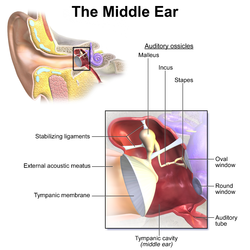Oval window
This article needs additional citations for verification. (January 2020) |
| Oval window | |
|---|---|
 Middle ear, with oval window at right. | |
 Right osseous labyrinth. Lateral view (label is vestibular fenestra — black circle near center) | |
| Details | |
| Identifiers | |
| Latin | fenestra vestibuli, fenestra ovalis |
| MeSH | D010046 |
| TA98 | A15.3.02.009 |
| TA2 | 6897 |
| FMA | 56913 |
| Anatomical terminology | |
The oval window (or fenestra vestibuli or fenestra ovalis) is a connective tissue membrane-covered opening from the middle ear to the cochlea of the inner ear.
Vibrations that contact the tympanic membrane travel through the three ossicles and into the inner ear. The oval window is the intersection of the middle ear with the inner ear and is directly contacted by the stapes; by the time vibrations reach the oval window, they have been reduced in amplitude and increased in force due to the lever action of the ossicle bones. This is not an amplification function, as often incorrectly reported. Rather, it is an impedance-matching function, allowing sound to be transferred from air (outer ear) to liquid (cochlea).
It is a reniform (kidney-shaped) opening leading from the tympanic cavity into the vestibule of the internal ear; its long diameter is horizontal and its convex border is upward. It is occupied by the ossicle of the stapes, the circumference of which is fixed by the annular ligament to the margin of the foramen.
Additional images
[edit]-
View of the inner wall of the eardrum (label is fen. oval. – black circle near top)
-
Cochlea
See also
[edit]- Round window
 This article incorporates text in the public domain from page 1040 of the 20th edition of Gray's Anatomy (1918)
This article incorporates text in the public domain from page 1040 of the 20th edition of Gray's Anatomy (1918)
References
[edit]External links
[edit]- Diagram at Washington University School of Medicine
- The Anatomy Wiz. Oval Window


